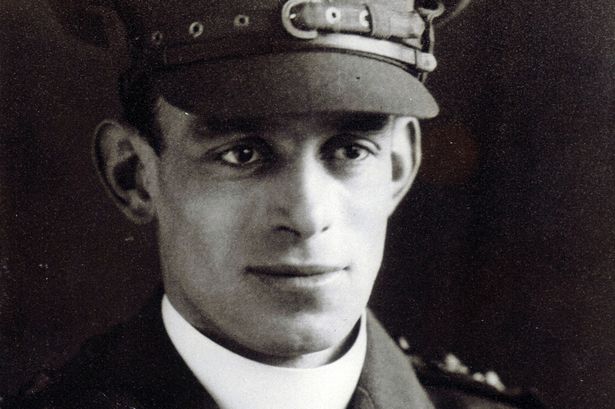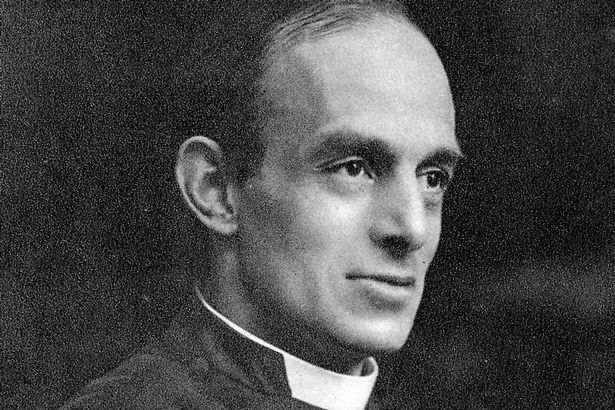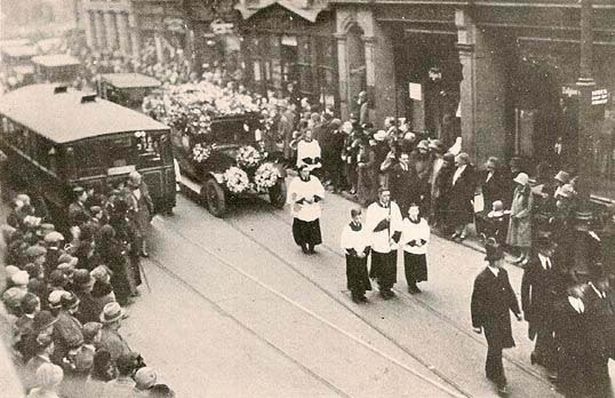Woodbine Willie – the cigarette saint of No Man’s Land
A book has been published recently which tells of the incredible courage of WWI army chaplain Woodbine Willie – the cigarette saint of No Man’s Land
Reverend Geoffrey Studdert Kennedy’s face was the last thing many stricken First World War soldiers saw before they died.
The heroic Army chaplain handed out cigarettes and spiritual aid to men gunned down on the front lines.
Clutching his Bible for protection, the “Battlefield Saint” would whisper the Lord’s Prayer and hold the hands of the wounded until the end.
His bravery in caring for soldiers and giving them one final “gasper” led to him being nicknamed Woodbine Willie.
The Army chaplain who ensured soldiers had the cigarettes they craved as they were not widely available
It also earned Studdert Kennedy a Military Cross from King George V, who later made him his personal chaplain.
Research has now revealed he returned home penniless because of his generosity in handing out cigarettes.
Academics believe he spent his entire wartime wages on hundreds of thousands of Woodbines for Allied soldiers.
Historians have long known Studdert Kennedy “administered” his own cigarettes to men on the front line to boost morale.
But nobody has ever tried to calculate the full extent of his generosity until now.
Biographer Dr Linda Parker spent five years researching Woodbine Willie’s remarkable life and she estimates the chaplain gave away 865,000 cigarettes at his own expense.
Over the course of nearly three years, from December 1915 to September 1918, Dr Parker believes the figure was every spare penny of his salary from the Ministry of Defence.
The generosity meant Leeds-born Studdert Kennedy sacrificed his own family’s financial future to give comfort to the men in his care.
Woodbines, which were strong and unfiltered, were not widely available on the Western Front.
They were considered gold dust in the trenches and word soon spread that a chaplain in his 30s was giving them away.
Records show he regularly ventured unarmed into No Man’s Land to give dying troops one final smoke.
It was this bravery at the Battle of Messines, in June 1917, that earned him his Military Cross, presented to him by the King.
Researcher Dr Parker said: “Studdert Kennedy was one of the First World War’s true heroes. He was a courageous and selfless Christian who gave away everything he had for the benefit of others.
“With the exception of his family’s living expenses, he spent the rest of his salary on the men he took under his spiritual wing.
“Through the course of my research it became clear that he did, in almost complete certainty, spend virtually everything he owned.
“He filled his backpack with Woodbines, bibles and a great deal of love.”
Dr Parker came up with the figure by calculating the total number of men that he probably met between 1915 and 1918. A packet of five Woodbines from the Navy, Army and Air Force Institutes cost 1d.
The funeral of Father Geoffrey Studdert Kennedy
His own expenses during the war were minimal as the Army supplied food, toiletries and accommodation.
The only cash he sent home was for wife Emily Catlow’s living expenses at their vicarage in Worcester.
His grandson, Rev Andrew Studdert Kennedy, said his generosity has rightly gone down in history.
He added: “I’ve no doubt whatsoever that he did everything within his financial means to help those men on the front line.”
Studdert Kennedy was born in Leeds in 1883 and served as a vicar in a poor parish in Worcester.
When Britain declared war on Germany, he encouraged his parishioners to join the army and enlisted as a Temporary Chaplain to the forces.
In 1915, while was stationed in Rouen, France, he held communion with the troops, some 96% of whom were smokers. He also helped to write letters for the illiterate.
When the soldiers left for the front line he gave them copies of the New Testament and one or more Woodbine cigarettes.
Troops were issued with two ounces of cheap rolling tobacco along with their rations but ready-rolled cigarettes were highly prized.
By early 1916, he was already known among soldiers as Woodbine Willie.
In the bloody trenches of the Somme, Ypres and Messines, he routinely prayed with dying troops.
He was awarded the Military Cross for running through “murderous machine gun fire” to deliver morphine to men screaming in agony.
Studdert Kennedy, who was stationed with the 7th, 46th, 24th and 42nd Divisions, was sent home on sick leave in late 1918.
After the Great War, he became a committed pacifist, social reformist, bestselling author and poet.
When he died in 1929, aged 45, King George V sent a telegram of condolence.
More than 1,700 people filed past his coffin in a single day as it lay in a Liverpool church.
And, touchingly, former servicemen sent a wreath with a packet of Wood- bines at its heart.
• Dr Linda Parker’s book A Seeker After Truths: The Life and Times of GA Studdert Kennedy (‘Woodbine Willie’) 1883-1929 is out now, published by Helion and Company.
The father of GA Studdert Kennedy served as curate-assistant in the parish of Ballymena in Connor Diocese before serving in the Church of England
StuddertKennedyfuneral.jpg
StuddertKennedy-2.jpg
Studdert-Kennedy.jpg





